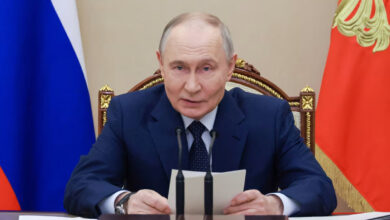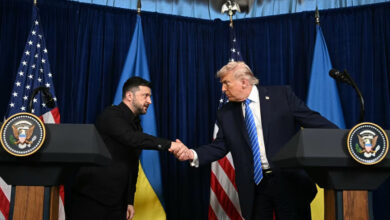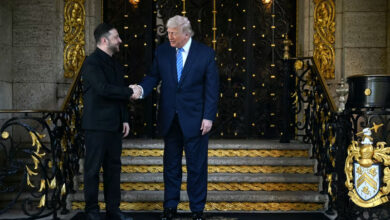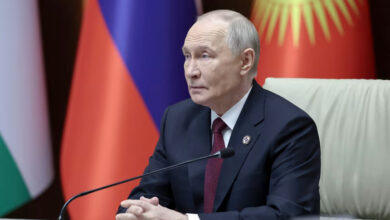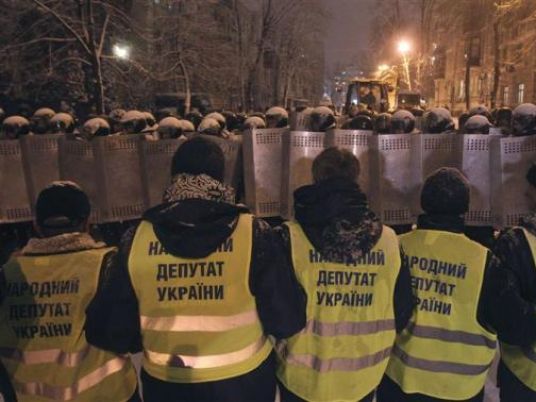
About 2,000 anti-government protesters huddled by braziers in their main tented camp in snowbound Kiev on Tuesday, in defiance of riot police who herded them away from government buildings overnight.
Dozens of riot police removed barricades leading to the presidency, cabinet offices and parliament. Protesters regrouped at Independence Square in central Kiev, where they have set up a makeshift tent village, complete with a stage where singers and speakers provide 24-hour entertainment.
The president's standard, a blue flag with a gold trident in the centre, flew outside his office, signaling Viktor Yanukovich was at work – possibly the first time since protests erupted on November 21 over his decision to scrap a trade pact with the European Union in favor of closer ties with Russia.
Demonstrators had feared the arrival of the riot police on Monday heralded a plan to crush the protests, but there was none of the violence seen last week, when dozens of protesters were wounded.
With the crisis weighing on an economy already on the brink of bankruptcy, Yanukovich will hold talks with three former Ukrainian presidents on Tuesday. He was expected to meet EU foreign affairs chief Catherine Ashton on Tuesday or Wednesday.
Ilya Shutov, an ex-miner from the eastern city of Donetsk, said the protesters would stay until Yanukovich left office.
“We were for the EU association agreement because we thought it would force our authorities to be civilized. Their refusal of Europe is a refusal to be civilized,” he said.
“Our goal is to get rid of the Soviet-like authorities.”
Visiting Moscow, US Deputy Secretary of State Victoria Nuland made a new appeal for calm in Kiev.
She “expressed US deep concern about the situation in Ukraine, and urged Russia to use its influence to press for peace, human dignity and a political solution,” the US embassy in Moscow said in a statement.
“The US supports Ukraine's European choice, a non-violent and just political resolution to the current standoff, and a return to economic health with the support of the International Monetary Fund,” it said.
But Russia's lower house of parliament was expected to approve a statement rejecting interference in Ukraine by Western politicians, following a visit to the protests last week by Germany's foreign minister.
In Kiev, liberals and nationalists have taken to the streets for demonstrations that have at times drawn hundreds of thousands. Thousands have also maintained an around-the-clock protest camp in the city centre, blocked roads, besieged government buildings and occupied the capital's city hall.
HUGE PROTESTS
Hundreds of thousands of people marched on Sunday, the second weekend in a row that such huge crowds have vented fury at a government they accuse of returning the country to Kremlin control. In a potent symbol, they tore down and smashed the capital's main statue of Vladimir Lenin, founder of the Soviet Union.
A week earlier, baton-wielding police injured scores of people at similar demonstrations. The police have since held back from using force to dislodge the protesters, but gave them five days from last Thursday to leave the streets.
The protesters say they will not go.
“We will stand here till the end to defend our rights,” said Sergei Kuzan, 29, a lawyer, part of a self-appointed security team ready to defend barricades at the main tented camp in Kiev's central Independence Square. “My task is not to let the police through, nor the provocateurs.”
The tented vigil in freezing temperatures copies a tactic from the “Orange Revolution” in 2004 which successfully overturned a fraudulent election victory by Yanukovich.
Ukraine's dire finances have both provoked the crisis and been worsened by it. EU leaders say their trade pact would have brought investment. But Ukraine's Soviet-era industry relies on Russian natural gas, giving the Kremlin enormous leverage.
Kiev is due to pay just under $4 billion in debt repayments and Russian gas bills in the first three months of 2014. Its foreign reserves have been eroded to prop up the local hryvnia currency. Central Bank figures on Friday revealed only enough foreign currency on hand for less than two months of imports.
It now costs more than $1 million a year to insure exposure to $10 million of Ukrainian debt over a five-year period, costs that have risen as the crisis deepened.
Yanukovich met Russian President Vladimir Putin last week. Little was revealed of the details of an agreement between them, raising opposition suspicions that Yanukovich had agreed to join a Russian-dominated customs union of ex-Soviet states, which would bury prospects for trade deals with Europe.
The crisis has divided Ukraine's 46 million people between its mainly Russian-speaking East, where many view Moscow as a source of stability, and its West, where mostly Ukrainian-speakers tend to prefer integration into the European mainstream.

